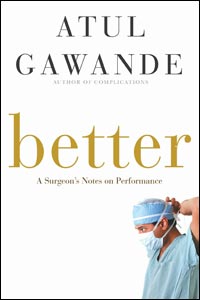BETTER
 What can medicine do to improve the quality of patient care around the world? That is, at its heart, the question that author Atul Gawande throws at readers and practitioners alike. "We can do better," he tells us, and thus begat the title: BETTER.
What can medicine do to improve the quality of patient care around the world? That is, at its heart, the question that author Atul Gawande throws at readers and practitioners alike. "We can do better," he tells us, and thus begat the title: BETTER.Having thoroughly enjoyed Complications, I decided to check out Dr. Gawande's other writings and was pleasantly surprised to find this collection of stories. Although both Complications and Better are short story compilations,
Complications lacked cohesiveness whereas Better had no such problems.
Leading us down simple and often shocking paths, Gawande gives us complicated facts but in laymen's terms. The simplest would be his chapter on hand washing, and how effective it can be for preventing the spread of infection, especially such newly dangerous things as MRSA, an antibiotic resistant bacterial strain that is killing hospital patients far too often. The ease with which its spread is preventable is as simple as a hand cleanser, yet getting doctors (and other medical staff) to do this is nearly impossible. "We can do better."
The beleaguered medical malpractice insurance requirements that plague every doctors pocketbook is hit hard upon, including a look at why it is necessary and why the system is headed for deep trouble. "We can do better."
Probably the most telling chapters were directed at Dr. Gawande's return to India (his national homeland). Polio is on the run and is nearly extinct as a disease. Yet in small Indian provinces, occasional "hot spots" flare up and a band of less than 10 medical men and women must vaccinate over 4 million children in less than two weeks. And they do it. Gawande tells us if this is possible, can't the U.S. do better at fighting infection? The other striking aspect is how India's doctors often work with substandard supplies (or minimal) on dangerous cases. Or perform a surgery they've never done before or are ill equipped to handle. But handle it they do. One such case involved a boy with hydrocephalus ("water on the brain" caused by a build up of cerebral spinal fluid). No physicians at the hospital Gawande visited had ever done a shunt, the procedure necessary to relieve the pressure. But they eventually do a makeshift surgery that saves the boys life "using about as few supplies as I'd use for a suture repair." Quite an eye-opener. "We can do better."
The chapters on CF (cystic fibrosis) are exceptionally well rendered as we learn that doing better at one thing can have huge benefits. When physicians focus all of their talents on cystic fibrosis, the result was astounding. Life expectancy for CF patients jumped from 17 years of age to over 40. And now it looks like they may very well be able to live into the 70s. It isn't some new super-drug that's extending these peoples lives, but looking at the disease process in terms of better treatment strategies; living proof that doing "Better" can help medicine achieve miraculous results.
Atul Gawande is to be commended for writing a book that flays open the medical system and exposes the diseases beneath; diseases that we can do better at.



0 Comments:
Post a Comment
<< Home